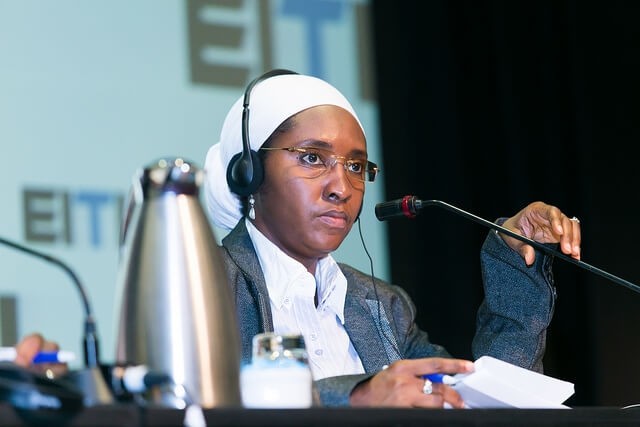 Mrs Zainab Shamsuna Ahmed, Minister of State for Budget and National Planning[/caption]
Mrs Zainab Shamsuna Ahmed, Minister of State for Budget and National Planning[/caption]
The Federal government has set a three year timeline to end fuel importation in the country.
This was made known after a meeting of the Federal Executive Council (FEC) on Wednesday in Abuja presided over by Vice-President Yemi Osinbajo.
Minister of State for Budget and National Planning, Zainab Ahmed, told journalists at the end of the meeting at the State House that the objective of the three-year deadline is to ensure availability of refined products, reduce demand on foreign exchange as well as export refined products.
Advertisement
“We are setting a three-year deadline to achieve self-sufficiency in refined petroleum products and to become a net exporter of petroleum products.
“The objective of this is to increase domestic supply of refined products and to reduce demand on foreign exchange for importing refined products in our country. The ministry of petroleum is pushing this. There is also a plan to push for the passage of the petroleum industry Bill (PIB) in conjunction with the National Assembly,” the minister explained.
According to her, 34 priority projects are to be executed in 2016 with clear deliverable targets and were grouped into four broad objectives – security/policy governance, diversification of economy, succour for vulnerable Nigerians, and relating the economy through investments.
“Our ministry’s presentation was introducing to council for discussion priority economic activities that we need to undertake to ensure that the purpose for which the 2016 budget was made, which is to stimulate the economy, to create jobs for our teeming youths and to extend support to the poor and very vulnerable is realised.
Advertisement
“We presented 34 strategic priority programmes that need to be realised within 2016. Each of these projects programmes has very clear deliverables and targets and indicators which will be measured to ensure that the respective ministries, departments and agencies (MDAs) deliver on what we committed to implement.
“These 34 specific areas are grouped into four major objectives. The first is policy, governance and security, second diversification of the economy, the third is creating support for the poor and the vulnerable and the forth is reflecting our economy through investment.
“The paper was well received by council, we got some very positive comments and the 34 priority projects were approved for implementation. The ministry of budget and national planning has been given responsibility to track and report on quarterly basis to the council on the performance of these key priority areas.”


